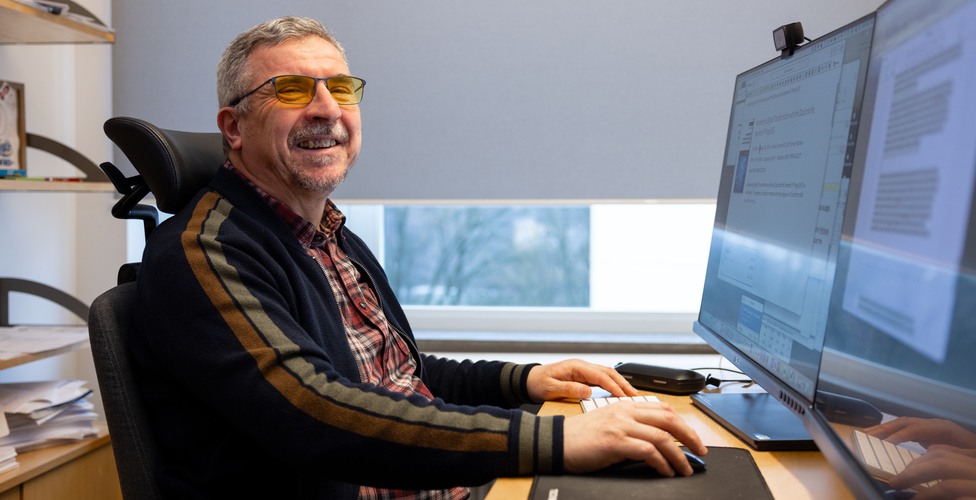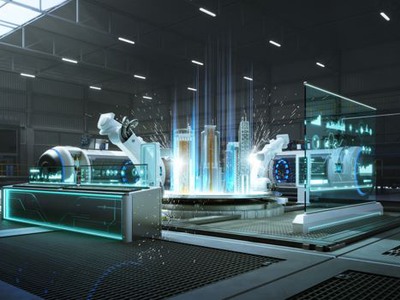The world is in the midst of a digital revolution. Today, your fridge can communicate with the power grid, and factories worldwide are controlled by algorithms and sensors. Navigating this change is not easy. Yacine Atif, Professor of Informatics at the University of Skövde, has recently released a book that can guide companies and organisations through their digital transformation.

Yacine Atif hopes that the book can become a valuable resource for everyone seeking to fully understand and harness the opportunities of digitalisation.
– I see how entire industries and business models are now being reshaped with the help of cloud services and the Internet of Things. I wrote the book to help organisations succeed in their digital journey, says Yacine Atif.
What is the Internet of Things?
The Internet of Things (IoT) is a network of connected physical devices that communicate and collaborate using digital technology. It allows machines and humans to interact in real-time, for example, to automate processes or reduce costs.
This can range from smart thermostats in homes that adjust temperature automatically to sensors in factories that optimise production.
From theory to reality
It sounds promising, but implementing digital strategies in practice can be challenging. This is where Yacine Atif's book Accelerating Digital Transformation with the Cloud and the Internet of Things (IoT) becomes relevant. It provides concrete frameworks and real-world examples from industries where it works.
One example from the book is Siemens' use of digital twins – digital replicas of production processes that are used to test and simulate changes.
– Through IoT and AI, Siemens can optimise its processes before making physical changes. This saves both time and money and is a solution that can be applied across many industries, says Yacine Atif.
Five tips for successful digitalisation
Yacine Atif highlights five insights from the book:
- Digital transformation is not just about technology – it requires a plan where people, security, and business processes interact.
- Technology that connects cloud services and physical devices can transform industries by enabling faster decision-making and automation.
- Data is the new currency but becomes valuable only when properly analysed and utilised.
- Security and integrity are crucial, especially as more devices are connected. Strict security protocols must be followed.
- A long-term strategy is essential for IoT and cloud services to deliver sustainable success.
Security and sustainability in focus
An important aspect of IoT is security. Yacine Atif recommends the "Zero Trust Architecture" method, which means that no device or user is automatically trusted, and all access is continuously verified.
– With Zero Trust, risks are reduced by ensuring that only the right people and devices have access to data.
Sustainability is also a central issue. The book discusses how energy-efficient solutions, such as low-power devices and optimised communication protocols, can contribute to reduced energy consumption. Furthermore, it emphasises the importance of using open standards to avoid dependency on specific vendors.
Smart strategies for lasting solutions
At the same time, security and legal compliance are significant challenges for companies investing in IoT. IoT platforms must manage vast amounts of data, implement strict security, and comply with regulations such as GDPR. Mishandling these areas can lead to both security incidents and legal consequences.
– By having a well-thought-out strategy focusing on scalability, security, and interoperability, organisations can minimise risks and create sustainable solutions, says Yacine Atif.
Towards a faster future with IoT, AI, and 5G
Yacine Atif predicts that IoT will play a more significant role in the future of digitalisation. The combination of IoT, AI, and 5G enables faster data management and real-time decision-making in sectors such as logistics, healthcare, and retail.
– IoT will support hyper-personalisation, where advanced data usage enables customised experiences in real-time, and create smarter, more autonomous systems. For companies wanting to stay ahead, this is a development to follow closely, and I hope the book can be a valuable resource for those who wish to understand and fully leverage the opportunities, says Yacine Atif.



